TAN SRI Simon Sipaun counts himself fortunate to be alive today. “My parents had five children, but only two survived…I was the third child and first to survive,” he recounts in an e-mail interview on 1 April 2011. Sipaun not only survived, but went on to win scholarships to Victoria University, New Zealand and Oxford University, England and was Sabah’s State Secretary from 1988 to 1993.
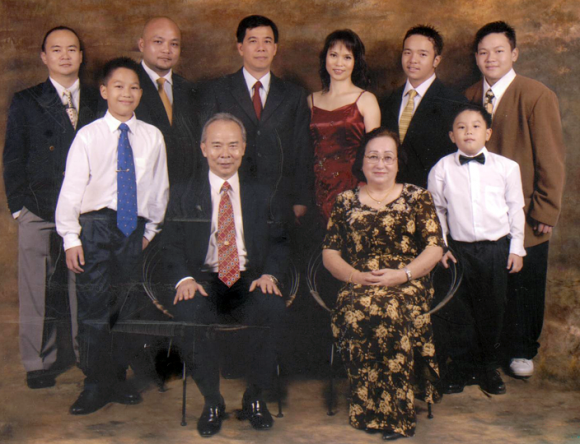
Amongst other senior positions, Sipaun was also vice-chairperson of the Malaysian Human Rights Commission (Suhakam) from 2003 to 2010. He continues his commitment to promoting human rights through the new Persatuan Promosi Hak Asasi Manusia (Proham), which comprises former Suhakam commissioners. Sipaun was appointed Proham’s first chairperson in March 2011.
TNG: Where and when were you born?
Sipaun: I was born in Kampung Tuavon in the district of Penampang, Sabah, on 30 Sept 1938. I grew up in the Penampang district which is about 15km from Kota Kinabalu (formerly Jesselton), Sabah’s capital.
What are your strongest memories of the place where you grew up?
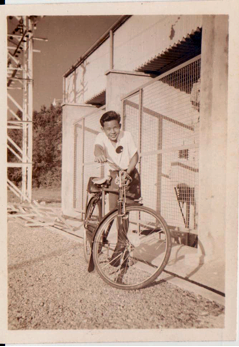
Although the village where I grew up is only about 15 km from Kota Kinabalu, during my childhood, there was no road to the capital. There were no modern amenities such as electricity and piped water supply; no hospital, telephones or post office. Most houses were built along the Moyog river which flows through several villages and was very important to the villagers’ livelihood. It was their source of water supply and fish; and means of transport. Unlike now, the river water was clear and clean and contained plenty of fish. I remember accompanying my father to catch fish almost every evening.
Practically every villager existed on a subsistence level, mostly through paddy planting. Cash income was very hard to come by. Cash income would be derived from the sale of jungle and agricultural produce including kampung chickens, eggs, vegetables and rice. However, not many of these products were available for sale as most were used for domestic consumption.
Paddy planting in those days was a hard and tough life. For the most part, manual labour was used except when buffaloes were used for ploughing. It involved maximum labour with minimum return. It was the kind of life that I always wanted to escape from.
The illiteracy rate was very high. Only a handful of people had the opportunity to go to school before the Second World War. Like many of the villagers, my parents were illiterate. Knowledge of hygiene and proper nutrition, if any, was therefore minimal. The mortality rate and incidences of infant deaths were high. For example, my parents had five children, but only two survived — my youngest brother, Stephen, and myself. I was the third child and the first one to survive. My two elder sisters and younger brother died when they were very [young]. I consider myself very lucky to have survived because I was suffering from beriberi, malaria and skin disease, all at the same time.
The Japanese occupation greatly aggravated the life of hardship and suffering. We were forced to leave our villages, and moved into the jungle to escape from the Japanese and the bombings. In the jungle we did not stay in one place all the time but moved from place to place. Several people died, mainly due to illness.
Can you trace your ancestry? How far back?
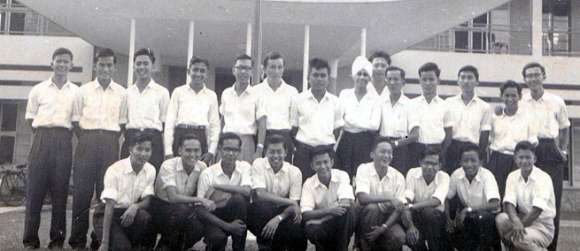
As my parents were illiterate, we did not have any written record of our ancestry. However I was told by my parents that my mother’s father was a Chinese from China with the ‘siang’ (surname) Liew. My mother’s name was Liew Ah Moi. However the Kadazans could not pronounce it properly and the kampung people called her Tagamoi instead. My mother’s brother was called Liew Ah Cheng but the kampung people called him Asing. My Chinese grandfather married a Kadazan from the Penampang district. I never met my grandparents from my mother’s side as they died before I was born.
My grandparents on my father’s side were both Kadazan. My grandfather on my father’s side also died before I was born. However, my grandmother lived with us for a number of years before she died of old age. She was a village priestess and traditional midwife.
Are there any stories you hold on to from your family?
Although my parents never attended school, they imparted excellent family values to my brother and I. My mother was a disciplinarian. She could not tolerate laziness. She always had a list of things for me and my brother to do. She was a very devoted Catholic although she was a convert. Most mornings she would walk about two kilometres to church to attend mass.
My father had plenty of common sense. His usual advice to me was to study hard because education was the only way I could break away from the vicious circle of poverty and ignorance. He said with education, I would be more aware of my rights as a human being and it would not be easy for other people to “con” me. Another piece of good advice he had was never to spend more than I could earn. [He advised me to] start saving as soon as I started earning, [to] have my own house as early as possible [and to] plan my future so that I would always be ready for a rainy day. He also advised me to never steal or cheat, and always be honest. I tried to follow his advice throughout my life.
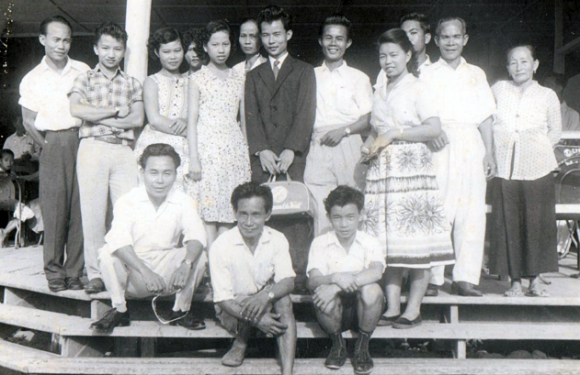
What was Sabah like when Malaysia was first formed in 1963 ?
Before Sabah (formerly North Borneo) merged with Malaya, Singapore and Sarawak to form the new nation Malaysia on 16 Sept 1963, it was a British colony. Life in Sabah just before Malaysia was pleasant and good to say the least. Admittedly, there was no development as seen today but Sabah was not alone. Malaya, too, was in a similar situation.
There were no racial issues and problems. Mixed marriages were very common. There were no problems associated with the unusually large population of illegal immigrants. There were no cases of Sabahans losing their citizenship status whilst foreigners gain it without much difficulty. There were no repressive and draconian laws such as the Official Secrets Act, the Internal Security Act, the Printing Presses and Publications Act, the Sedition Act, the Police Act and the four proclamations of emergency. There was no quarrelling over dead bodies. The composition of the civil service was multi-racial. Meritocracy was appreciated, observed and practised. Corruption and “ketuanan Melayu” were unheard of. No community claimed ownership of the Arab word “Allah” for God. The word has been used by Christians in Sabah during worship for as long as I can remember. Christians never had problems importing and using the Holy Bible in whatever language. People belonging to other faiths never experienced any kind of confusion. The list continues.
If Sabahans are now conscious of racial and religious divides, I believe they would have learned them from Semenanjung.
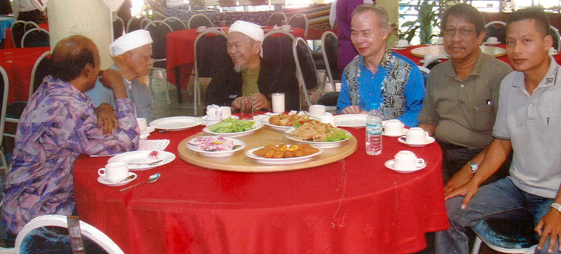
Are there any aspects of your identity that you struggle with as a Malaysian?
I like to identify myself as a Malaysian first. However, there are constraining factors. Top political leaders who should show leadership by example, are reported to have stated that they are Malays first and Malaysian second. There are judges who consider themselves Malays and Muslims first and judges second.
I note with interest the latest and current slogan of “1Malaysia, People First, Performance Now”. It sounds attractive but it is not matched by actions. Government authorities instead appear to focus on our differences instead of our similarities and shared humanity. In [some] government forms for example, I believe there are four boxes — one for Malay [Malaysians], one for Chinese [Malaysians], one for Indian [Malaysians] and one for others. Why can’t there be just one box for everybody?
Describe the kind of Malaysia you’d like for yourself and for future generations.
Genuine unity and national integration are vital for Malaysia’s survival. It cannot be denied that this country has many divisive factors. It is a land of “multis”. The process of unifying and integrating should be based on justice, equal rights and respect. Article 1 of the Universal Declaration of Human Rights provides that all humans are born free and equal in dignity and rights.
No nation which embraced race-based politics, with one community claiming superiority over others, has survived. Nazi Germany and apartheid South Africa are cases that come to mind. We are all Malaysians and equal before God.
To reduce, or even eliminate polarisation, the composition of the public services and government agencies should be more reflective of Malaysia’s multi-racial society. Meritocracy should be recognised, appreciated and practised, otherwise Malaysia will lose out in a globalised and highly competitive world.
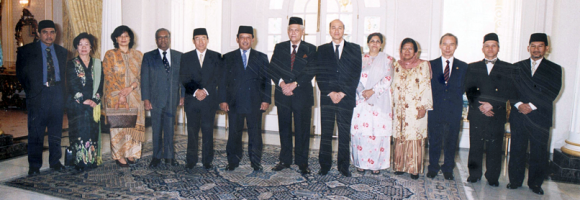
We should concentrate on enlarging the size of the economic cake and spend less time and effort [arguing about] how to share it. We should have a sound education system on par with the best in the world and all Malaysians should be subjected to the same system.
No Malaysian or community should feel deprived or marginalised. Everyone should be treated equally and fairly. Selective prosecution or application of the law should not arise. All laws which empower the government to arrest without trial should be repealed.
I would like to see more [statespersons] and less politicians in this country. It has been said that politicians think in terms of the next election but that [statespersons] think of the next generation.
Good governance should be the order of the day. Corruption should be eliminated or at least minimised. The provisions of the Treasury Instructions should be fully complied with. The illegal immigrant problems in Sabah should be resolved efficiently and effectively.
Respect for human rights culture should be promoted and protected. ![]()
The book Found in Malaysia, featuring 50 of our best interviews plus four previously unpublished ones with Datuk Zaid Ibrahim, Tan Sri Rafidah Aziz, Datin Paduka Marina Mahathir and Ramli Ibrahim, is available at all good bookstores for RM45.


kamal says
“There was no quarrelling over dead bodies. The composition of the civil service was multi-racial. Meritocracy was appreciated, observed and practised. Corruption and “ketuanan Melayu” were unheard of.”
He is right. So where did Malaysia go wrong and how do we find our footing back as a rich multicultural community?
Vin says
@kamal “So where did Malaysia go wrong and how do we find our footing back as a rich multicultural community?”
I think it’s easy to find the answer. Listen again to Lee Kuan Yew’s arguments prior to Singapore’s separation from Malaysia. The man foresaw the effects of “Ketuanan Melayu” long before the term was ever invented, and long before its effects became a major problem facing Malaysians today.
spook says
I like the part when you were really honest about the whole 1Malaysia thing. No offence, but some of the things proposed here in Malaysia are hurtful, and are really unnecessary, too. I really wish there were more people like you, sir.
leena says
Stop voting for BN.
it’s time we change our mindset.
Sarawak Partiots says
FULL MARKS FOR SIMON.
We agree with every word. Sarawak was independent in 1941. and by 1942 was occupied by the Japanese and became a British colony by 1946. And in 1963, it became the new colonial acquisition of Umno Malaya.
Sarawakians are paying in every way for the betrayal by their so-called leaders in 1963 by their sell-out to Malaya under the so-called “independence in Malaysia” plan. Sarawak, so rich in natural resources like oil and timber, has been reduced to be one of the poorest “Malaysian states” after 47 years of so-called independence.
We yearn for life before 1963. At least we were not suffering from oppression and plunder as much as we are under Umno Malayan colonial rule. Life was better before 1963!